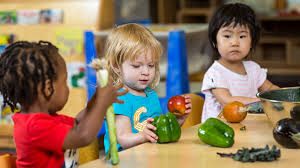
Wellness and well being in early childhood
As per psychology, childhood stage refers to the stage of human development between 3 and 11 years. The time period between the age of 3 and 8 years is considered as early childhood stage, while 9 to 11 is middle childhood stage. When a child is born, what matters is the health or fitness of the child. Parents do lot of things to ensure that their child is healthy and fit. Still, there are a number of children who do not grow properly, even after getting so much care from their parents. Sometimes, diseases either go unnoticed by the parents, or they ignore the abnormal signs of their child’s health, thinking that it will be recovered in future.
As per Jean Piaget’s theory of cognitive development, at pre operational stage (2 to 7 years), a child starts thinking symbolically. A child starts developing an idea of past and future and the imagination is also developed by this stage. According to Jean Piaget, all humans go through cognitive stages of development. The only difference is that some children show such signs at later stages and some show such signs at earlier stages. At the time of initial level of early childhood stage, a child must attain a sign vocabulary which shows a child’s capability to think and the child at this stage shows development in the physical appearance. Childhood stage is a stage where a child develops his or her capability to think concretely and develops some capability to think logically, but not reasonably. If such development is not seen in a child then it is referred as non-wellbeing of a child.
What actually refers to wellness and well being of child?
A child is said to be well-being when he or she is physically and mentally healthy, and is capable to enjoy all day to day activities comfortably. Well being means attaining all the elements of wellness. Well being is thus attained when wellness is there. In other words, a child is capable to do his or her daily tasks and enjoy daily moments when he or she is physically and mentally healthy. The overall picture of wellness of a child implies to eat well, be active while performing activities, mental and physical health, feeling safe, strong family and learning support. Early childhood is the only stage where a child’s mind and body can be shaped-up by the family in order to make the child ready to face the future. This also means that children at this stage are more dependent on adults for their basic needs, because of which circumstances like disability and no family can hamper their growth greatly.
Why does well being matter for children?
A strong sense of well being makes a child confident and active. To support a child’s learning, it is very much important to understand the well being of the child. Parents are said to be the first agency of children, and after parents, it is the teacher who can help in the teaching-learning process and can therefore introduce some confidence within the child. A child’s well being is not just limited to physical and mental health. It has greater scope than these concepts. A child needs emotional, social and environmental support to grow with a positive attitude.
Physical wellness: A child is said to be physically fit when he or she has well developed psychomotor skills, i.e., to move hands and limbs as per human capabilities.
Mental wellness: When a child is capable to process information, and can work or respond accordingly, then the child is said to be mentally fit.
Emotional wellness or support: A child needs to be supported emotionally, or else the child will become emotionally imbalanced. This can further create mental issues for the child. It has been estimated that almost 10-14% of children (by the age of 5) suffer due to emotional and behavioral disturbances.
Environmental support: It can be internal, related to child’s genetic issues and it can external, related to the environment in which a child lives. Environment inside the house and the environment surrounding the house produce a great effect on the thinking of a child. For example, a child learns to use abusive language by seeing his parents abusing each other. On the basis of data (based on Australians), one in four young child suffers due to mental health conditions, one in six is experiencing anxiety issues and suicide is killing more young Australians than car accidents.
How can one create a supportive environment for young educators?
One and only weapon to promote well being of young ones is to educate them. With the help of educational services, proper interventions can be made to make them feel happy and healthy. Some interventions may include a child to move away from the things he or she likes to do. For instance, a child demands to play with toys rather than studying or performing an activity. And when asked to not have the use of toys, the child cries while becoming emotional. In such situation, songs can be played or sung by the care taker to distract a child and develop some good skills in him or her.
In fact, it is only when a child is emotional well and fit that he or she can grow into a successful and happy adult later on in life. These days, it is very difficult to be a student, since one has to constantly juggle between school, assignments, homework and social life. Even though a lot of assignment help providers and professors strive to make life easy for these children by helping them with their college work, it is the responsibility of the parents to act very carefully right from the initial stages to ensure a happy future for the child.



